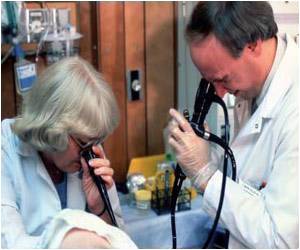
"The circadian clocks of fruit flies and humans share molecular components, making the fruit fly an outstanding model for genetic studies focused on circadian behavior," said first author Yanmei Huang, research assistant professor of neuroscience at TUSM and a member of Jackson's team.
This study uses an innovative ribosome profiling technique to reveal the complete circadian program of protein synthesis (the 'circadian translatome') within these clock cells. Fruit flies were collected at different times of the circadian cycle, and mRNAs bound to ribosomes were isolated from clock cells; they were identified and quantified using RNA sequencing methods to document patterns in protein production.
Messenger RNAs (mRNAs) carry instructions for protein production in a process called translation. Jackson's team used translational profiling, a method that indirectly reveals the production of proteins, and RNA sequencing to determine exactly when proteins in clock cells are produced from mRNAs. They identified 1,069 mRNAs, including hundreds of novel mRNAs that show peaks in translation at certain times of the day.
Proteins formed from these 1,069 mRNAs were classified by their biological function. Among the proteins whose functions are known, the researchers found that proteins required for similar functions were produced at the same times. Proteins required for metabolism show peak production during the day, while proteins required for cell growth show peak production during the night.
The researchers hope that by identifying the specific times proteins are produced in clock cells and their functions, they can better understand how the circadian clock regulates protein production and the body's biological systems. This, in turn, will provide insight into diseases and psychiatric disorders caused by disruptions in the circadian system.
Advertisement
Jackson's research in Drosophila has focused on genes and neural circuits that regulate circadian behavior. Some of his other recent work, in collaboration with postdoctoral associate Dr. Fanny S. Ng showed that astrocytes, a type of glial cell in the brain, are critical in regulating circadian rhythms.
Advertisement
Source-Eurekalert










